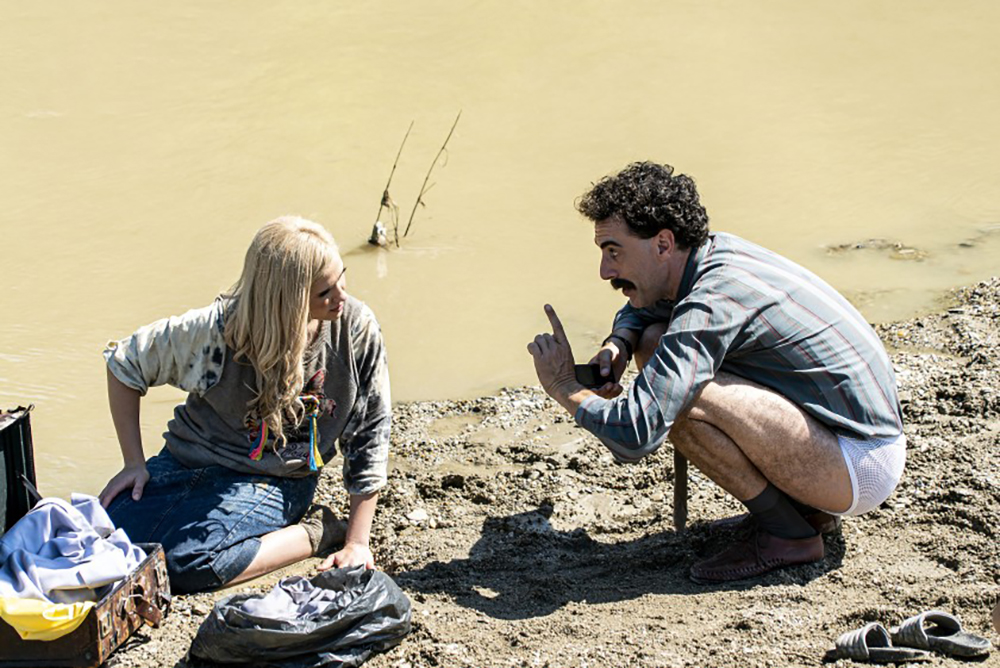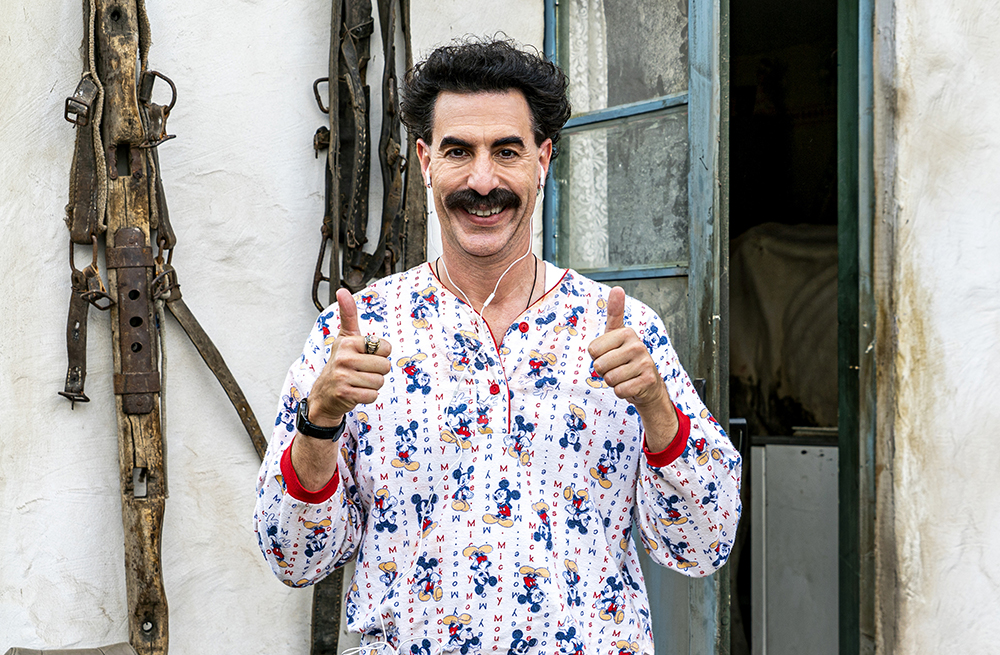Some films can leave a big impression on viewers, which can be both good and bad. Most filmmakers try to give the right message by bringing different combinations to help them fulfill their need. Humor is something that has always played a critical role when it comes social commentary and messages. When we first saw the raw and funny mockumentary “Borat: Cultural Learnings of America for Make Benefit Glorious Nation of Kazakhstan” in 2006, we got a sense of those issues with a dose of laugher. Now, after 14, Borat is back again with the same long mustache and a bag of new jokes.
The story begins with Borat Sagdiyev’s (Sacha Baron Cohen) release from prison after 14 years for bringing shame to his homeland of Kazakhstan and the country’s people. As he comes out, his life is upside down. He has no home, family, or respect. The nation decides to send Borat as a messenger to the United States to fix the reputation he has ruined, by getting a favor President Trump, so he would appreciate Kazakhstan’s president as one of his strongman friends.
Borat’s mission is delivering his Nation’s greatest celebrity, Johnny the Monkey, to president right arm and famous lady’s man Michael Pence. As he reaches America and opens Johnny’s crate, he is surprised to see his teenage daughter Tutar (Maria Bakalova).
Now his original plans are derailed. So Borat decides she’ll be the gift, and his teenage daughter is rapturous because she dreams of living in a fancy place. The father and daughter duo set off across America state-to-state, getting in various misadventures along the way, in the middle of a pandemic and with an election looming in distance.
Sacha Baron Cohen’s laughs in the first “Borat” film came by his interchanges with actual people who are not aware of being in his film. He made them believe him as a foreigner who is unknowing of American standards and manners. In these conversations, he was straightforward and direct. Most people felt comfortable sharing their personal beliefs as he was simply an extreme version of them. Still, it’s different for the second film. This time it’s more about bringing laughter from surrounding events.
“Borat Subsequent Moviefilm’s” writing has been done by a mixture of different writers such as Baron Cohen himself, Nina Pedrad, Anthony Hines, and Dan Swimer. The approach for the script is boldly vocal, tackling many new issues this time. The gags and characterizations of societal consideration are the nib and the misfire risk, which impart enthusiasm to the usual segment.

But the team of writers brings in a new sense of layering to the screenplay that may surprise viewers. One of the key parts about the writing is that it is incredibly detailed; each dialogue is worth paying attention to, no matter how offhand it appears. Throughout jokes in one sequence, Borat wishes to kill himself, but says he doesn’t have the money to buy a gun, so he goes to the nearest synagogue to wait for the next mass shooting. The story takes on many things like the Coronavirus, Facebook conspiracy theories, white supremacy, the #MeToo movement, and various government-related scandals. Still, it all gets done in a satirical way by keeping the laughter at the forefront.
Although “Borat Subsequent Moviefilm” is ferocious and goofy, all of the lengths that center on Borat’s relationship with his daughter are gratifying. Director Jason Woliner does good work in setting up the film’s themes, and smartly mixes in stock footage with shorts. The shooting approach remains the same, but he keeps things running smoothly, which helps the movie land as a mockumentary yet feels like a regular flick. The cinematography of Luke Geissbuhler is pitch-perfect in each short, which helps the along the filmmakers’ vision. The film’s music is solid and never interferes with the scenes. The use of folk music is perfectly synced by Erran Baron Cohen (Sacha Baron Cohen’s older brother).
Sacha Baron Cohen is an actor who owns every role he plays. When we first see him in the character of Borat, he had little time to prepare; yet he got into the role so well that it does not feel like it’s been 14 years since he played this. This time, the story has evolved. We see multiple well-written characters, especially Tutar, played by Maria Bakalova; she is the heart of the film, which is at the right place that brings a new direction to the story. Her chemistry with Baron Cohen is a delight that can be seen perfectly in the film.
It’s amusing to see the conflicting narrative instinct of the first “Borat” film and this one; even when it’s sometimes tough to receive at face value. This sequel binds every component to a unifying aim—that by poking fun and making satire, the film becomes a window that is a mirror of today. There are not many stories as urgently satirical and courageous as this one.
Overall, “Borat Subsequent Moviefilm” is an audacious and bold film that is not afraid to take on the issues. It is fearless, but finds its right balance in showcasing what is both right and wrong around us. It has enough laughs to make your jaw hurt, and some amazing cast performances that one should not be missing. You can check out the film now on Amazon Prime.



1 Comment
Great review will be seeing this film.